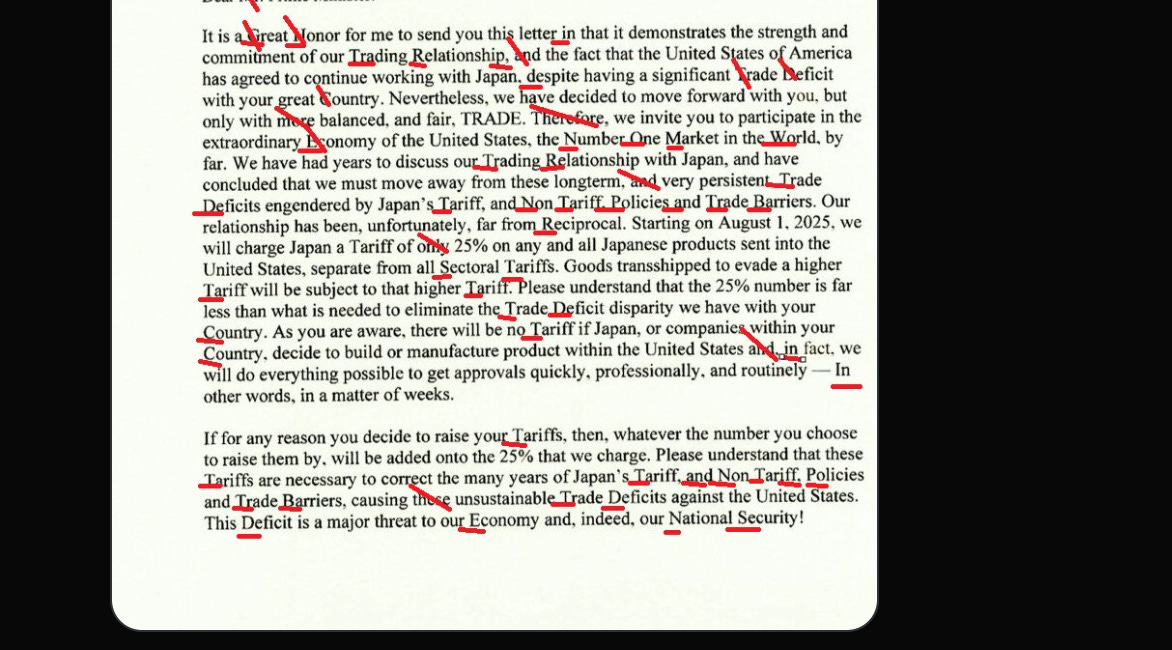BREAKING: Canada and Japan Forge a Landmark Intelligence/Military Pact Amid Trump-Era Alliance Strains
As Trump bullies allies and burns intel bridges, Canada and Japan are quietly building a new democratic alliance without him
When Canada and Japan signed a classified intelligence-sharing and military technology pact in Tokyo today, it didn’t just signal a deepening friendship between two Pacific allies.
It screamed: “We’re done waiting for America to grow up.”
This new Security of Information Agreement (SIA) lets Canada and Japan seamlessly exchange national security secrets and collaborate on sensitive military procurement, without U.S. approval, oversight, or risk. And if that sounds like a diplomatic middle finger to Donald Trump’s chaos circus, that’s because it is.
Trump has spent years torching America’s credibility with its closest allies. From threatening Japan’s economy with unilateral tariffs to calling for the seizure of Canadian land like a Bond villain, his return to power in 2025 has forced longtime U.S. partners to quietly ask themselves the unthinkable:
Can we still trust America with our secrets?
Canada and Japan just answered that question. Loud and clear.
Five Eyes... Minus One?
For 75 years, the Five Eyes intelligence alliance—Canada, the U.S., U.K., Australia, and New Zealand—stood as the gold standard of trust. Until Trump.
Under Trump’s leadership, America has become the weakest link in the chain. Not because it lacks power, but because it lacks character.
He spilled Israeli intelligence to Russian spies in the Oval Office. He tweeted satellite photos that exposed U.S. surveillance capabilities. He stashed top-secret nuclear and battlefield secrets in bathrooms at Mar-a-Lago. And he bragged about it.
This isn’t partisan spin—it’s a national security nightmare.
And America’s allies have noticed. British intelligence reportedly “limited” what they shared with the Trump administration. Some NATO allies stopped short of sharing intel that could expose their assets. Even Canada and Australia began rerouting sensitive data through tighter channels.
Now Japan, long seeking entry into the Five Eyes club, is working around the problem altogether by linking directly to the members they trust.
The result: a quiet, strategic effort to build what defense insiders are calling a “Five Eyes Plus Japan” model. One that doesn’t rely on the U.S. behaving itself.
And why should it? Trump is back—and already threatening allies like it’s a blood sport.
Tariffs, Tantrums, and Territory Grabs
Trump recently slapped a 25% tariff on all Japanese goods, triggering shockwaves through a fragile Indo-Pacific trade balance. He called Japan a “cheater,” said it was “using” the U.S., and demanded Japan quintuple payments for U.S. troops stationed on their soil.
That’s not alliance. That’s extortion.
Canada hasn’t fared much better. Trump’s trade war playbook is back—tariffs on Canadian steel, aluminum, and auto parts. He’s even flirted with a bizarre annexation fantasy, suggesting that Canada would “benefit” from becoming the 51st U.S. state. (Spoiler: We’re good, thanks.)
Justin Trudeau’s response? A warning to the world: “If the United States is willing to do this to its closest ally, then everyone should be very, very concerned.”
And they are.
Japan’s defense minister said this new Canada pact was critical “given today’s global challenges.” That’s polite diplomat-speak for: “Trump is back, and we’re not f**ing around this time.”*
The Deal That Changes Everything
The SIA is a legally binding agreement signed by Canada’s Anita Anand and Japan’s Takeshi Iwaya. It standardizes how both nations handle, protect, and dispose of sensitive security data—laying the foundation for even deeper cooperation.
This isn’t just about paper pushers and file cabinets.
This is about building a new democratic security architecture between like-minded nations that don’t trust Trump’s America with their crown jewels.
It enables two-way defense procurements, joint development of military technology, and access for vetted Canadian and Japanese firms to classified defense projects.
It’s a full-circle moment for two G7 democracies who’ve had enough of Washington’s volatility and are choosing predictability over personality cults.
What’s Next? Trust-Based Alliances Without Trump
Let’s be honest: Trump is a one-man wrecking ball of international trust. Allies are sick of the volatility, the threats, the performative ego, and the constant leaks.
They’re hedging.
The Canada-Japan pact could be the first domino in a larger realignment, where Five Eyes becomes Four Eyes, and democratic allies like Japan, South Korea, and the EU start building parallel intelligence pipelines to bypass the circus in D.C.
The U.S. has always been the beating heart of Western security. But if the heart becomes infected, the body has no choice but to isolate it.
And those conversations are happening now.
This Is What Democracy Looks Like
In a world where democracies are under siege—from foreign autocrats and domestic strongmen—Canada and Japan just showed what responsible leadership looks like.
They’re not waiting around for Trump to “pivot.” They’re not betting on a stable America. They’re doing what good allies do when faced with a dangerous partner:
They’re preparing for the worst, and planning without him.
In a time of crisis, alliances are only as strong as the values they’re built on. And right now, Canada and Japan are choosing competence over chaos, democracy over dictatorship, trust over Trump.
And this is just the beginning.








So the defense of democracy no longer involves the nation that dreamed up the Declaration of Independence and the Constitution.
Of course.
This heart transplant is long overdue.